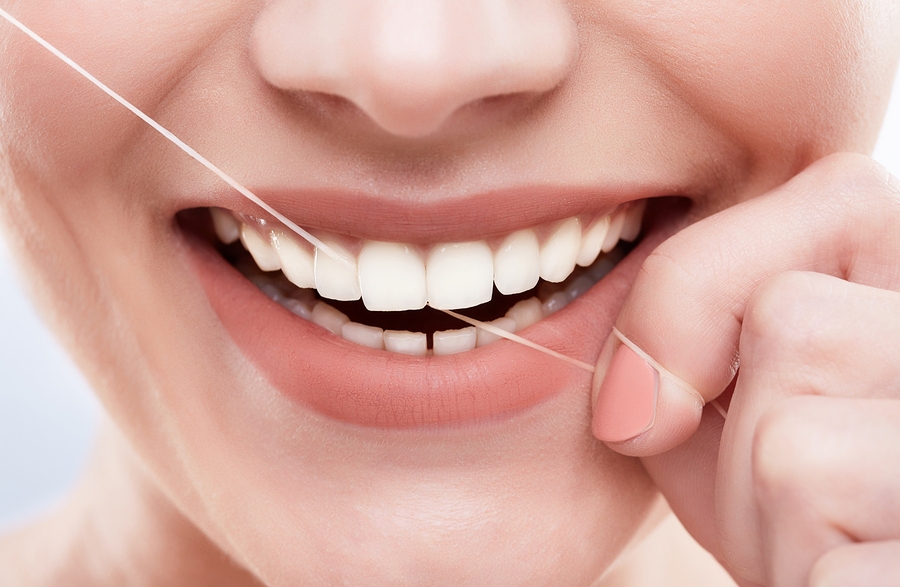September: National Gum Care Month (Why Bleeding From The Mouth is NEVER ok)
August 23, 2018

Has this ever happened to you? You’re flossing or brushing your teeth and you spit in the sink and see something bright red – it’s blood.
This is something most people have experienced at one time or another. And while it doesn’t require a trip to the emergency room, it is a sign that something’s not right. Here’s why you should never ignore bleeding from the gums, and what you can do about it.
The Cause of Bleeding from the Gums
Many things can cause bleeding from the mouth, including physical trauma and sores, but today we’re interested in the kind caused by gum inflammation and gum disease. These both occur when bacteria from the plaque on teeth attacks the gum tissue. Periodontists (dentists who specialize in the gums) make a distinction between gum inflammation, called gingivitis, and gum disease, called periodontitis.
Gingivitis is an inflammation of the gums, which leads to them being swollen and red. They are also likely to bleed during flossing or brushing. The good news is that gingivitis typically isn’t painful and can be fully reversed with good care.
Periodontitis is a disease of the gums, which can happen when gingivitis is not treated in time. It can lead to the destruction of the gum tissue and the bone that supports the teeth. Untreated periodontitis can result in receding gums, tooth loss, and even system-wide infection as the bacteria that’s normally confined to the mouth finds a channel to the body through the compromised gum line.
As you can see, gum disease is serious, and if left untreated, can cause some undesirable consequences. Fortunately, there are things you can do to improve the health of your gums.
What To Do When You Have Bleeding Gums
Pay attention to the signs. In addition to swollen, red, and bleeding gums, other signs of gum inflammation and gum disease are chronic bad breath, pus between teeth, mouth sores, sensitivity to extreme temperatures, and loose teeth.
Continue to brush and floss as before, even if your gums bleed again. When caught early enough, the bleeding will stop on its own within a few days as the inflammation dies down. Adding an alcohol-free mouthwash to your routine, if you don’t already use one, can also help reduce plaque.
See your dentist regularly for check-ups and cleanings. Your dentist can discuss gum health with you and your hygienist can show you how to floss correctly if you’re unsure.
See a periodontist if you’re at all concerned. Your dentist may refer you or you may make an appointment on your own, particularly if you see receding gums or have a family history of gum disease.
Risk Factors for Gum Disease
There are many risk factors for gum disease; knowing them is another way to take care of your gum health.
- Poor oral care: lack of brushing, flossing, and dentist visits; untreated habits like jaw clenching and teeth grinding
- Age: Gum disease increases with age. Over 70% of adults over 65 have some form of periodontal disease compared to 47% of adults 30 and over, according to the CDC.
- Smoking: Smokers have twice the risk of developing gum disease compared to a non-smoker, according to the CDC, and the risk increases with the number of cigarettes smoked.
- Genetics: A family history of gum disease may mean you’re more likely to develop it yourself, even with good oral care.
- Medications: Certain prescription meds, including oral contraceptives and anti-depressants, are linked to higher rates of gum disease.
- Stress: Stress is also linked to gum disease, probably because the stress response makes it harder for the body to fight off infection of any kind.
Other factors: For various reasons, obesity, diabetes, rheumatoid arthritis, automimmune disorders, and pregnancy are all linked to gum disease.
September is National Gum Care Month
What better time to start paying more attention to your gums? As an orthodontist, my main focus is on the alignment of the teeth and the bite, but I know how important it is to take care of every aspect of oral health.
A little spot of blood can your first sign that it’s time to take more care of your gums – don’t ignore it!
Have a Question?
Check our FAQs or ask here.
Are you ready to pursue your amazing smile?
Our short quiz will point you in the right direction.
Take the Quiz